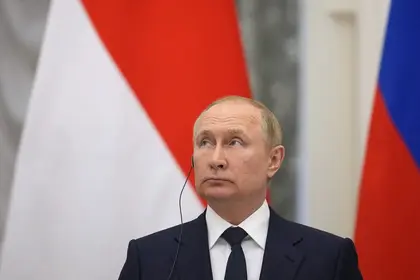“Troubling”, “a betrayal”, “depressing” — Moscow’s humiliating setbacks in eastern Ukraine over the weekend sent Russian hawks into a frenzy.
To put an end to the avalanche of scathing critiques, the Kremlin issued a warning to those who would go too far in questioning its strategy.
JOIN US ON TELEGRAM
Follow our coverage of the war on the @Kyivpost_official.
Dissenting voices need to “remain within the law” that punishes people “discrediting” the army, Kremlin spokesman Dmitry Peskov said on Tuesday.
“The line is very, very thin, one must be very careful here,” Peskov continued.
The Russian defence ministry is painting the setback as a strategic “regrouping” of its troops and denying any debacle took place.
But this weekend’s news threw a wrench into the Russian media’s previously harmonious choir that had been relaying the Kremlin’s message since the beginning of the special operation: everything is going to plan.
Even Vladimir Solovyov, one of the main Kremlin propagandists, admitted that “the situation is difficult, serious.”
And something once inconceivable happened.
A flurry of media pundits, analysts, bloggers and officials criticised the handling of the operation on TV shows and on social media.
Hardline Chechen leader Ramzan Kadyrov lambasted the “mistakes” he said Russian generals had made in a voice note to his 2.4 million followers on Telegram.

Trump Makes 90 Day Foreign Aid Freeze – Ukraine Military Support Supposedly Untouched
If no changes were made in the conduct of the special military operation, “I will be forced to go speak to the ministry of defence and the country’s leadership to explain the situation on the ground,” he said.
– ‘Betrayed’ –
The opposition, though weakened by a huge crackdown since the beginning of the offensive, doubled down on the criticisms.
Local elected officials in Saint Petersburg called for President Vladimir Putin’s resignation — even if their petition has about zero chances of succeeding.
What’s new is that criticism is now coming from nationalist groups who usually fervently support the military operation.
While not the first setback for the Russian troops — who retreated from Kyiv and lost their admiral ship in April — this was particularly shocking to them.
Conservative commentator Yegor Kholmogorov said there were only two possible explanations for the blow.
Either “we were betrayed,” or “our army is not fit for combat,” Kholmogorov said.
On a televised debate, former lawmaker Boris Nadezhdin argued that “it is absolutely impossible to defeat Ukraine using resources that Russia is fighting with, and with its colonial war methods, using contract soldiers, mercenaries and no mobilisation.”
He was swiftly put in his place by another guest.
Some of the military operation’s staunchest supporters are now calling on the Kremlin to scale things up in Ukraine.
Blogger Maxim Fomin — writing as “Vladlen Tatarsky” on a Telegram channel followed by more than 400,000 people — prescribed a “preventive nuclear strike” on Snake Island, abandoned by Russian troops in July.
– No risk for Putin? –
Speculations abound as to what this blow could mean for Putin.
The government is not facing major risks yet, according to R.Politik founder Tatyana Stanovaya.
But if the situation keeps deteriorating on the frontline “with more losses, more defeats, a retreat, then the relationships between patriots and the authorities could seriously be put to the test,” she told AFP.
It could be harder to clamp down on those critics, Stanovaya explained.
Contrary to the opposition that was “squashed (by being painted) as an ideological enemy and mouthpiece for the West”, a so-called patriotic protest could be “seen as legitimate” in Russia.
You can also highlight the text and press Ctrl + Enter










